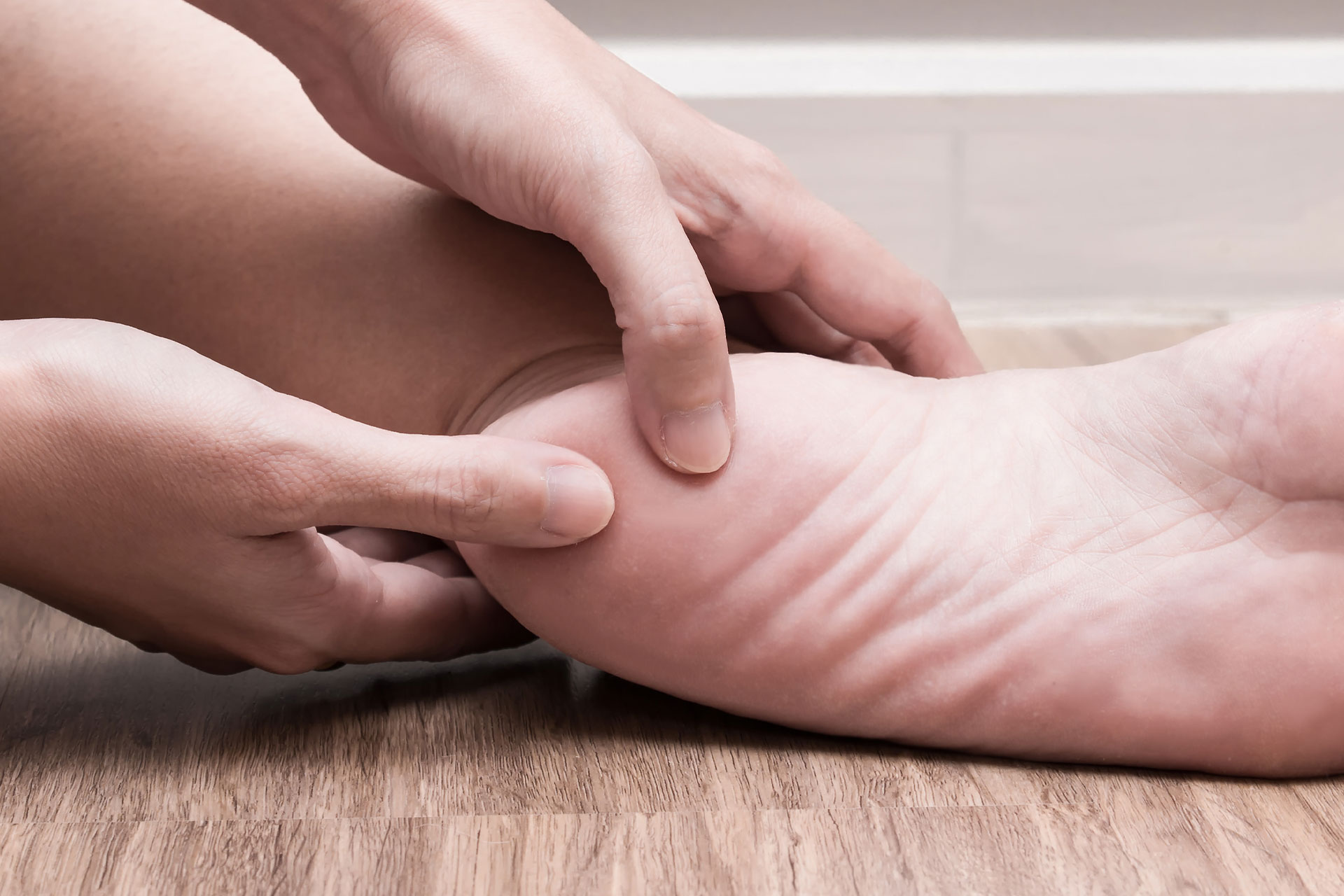Same day appointments, walk in clinic
Same day appointments, walk in clinic

Your heel not only supports the weight of your body, but it also absorbs the impact each time your foot hits the ground and helps to spring you forward with every step you take. Although your heel can handle heavy loads, too much stress can lead to problems.
Pain under the heel is frequently associated with plantar fasciopathy. This condition affects the band of connective tissue that runs along the bottom of the foot from the heel to the base of the toes. According to statistics, plantar fasciopathy affects 1 in 10 people at some point during their lifetime. In the United States alone, more than two million people receive treatment for this painful condition.
If you experience heel pain when you first get out of bed in the morning, after sitting for a while or following prolonged activity, your discomfort may be a sign of plantar fasciopathy. Contact our office for an evaluation and care. Both early diagnosis and intervention help to prevent further damage to foot health and function. For many people, conservative therapy alone may offer relief. Initial recommendations such as rest, modified activity, ice massage, oral analgesics, supportive shoes, and stretching techniques can help alleviate your discomfort. Along with these modes of treatment, our office may also prescribe physical therapy, foot orthotics, night splinting, casting, or corticosteroid injections.
However, when symptoms of plantar fasciopathy are debilitating and persistent even after an extended course of conservative therapy, the next step may be extracorporeal shock wave therapy (ESWT). This non-invasive method of care involves the targeted delivery of shock waves to injured soft tissue to reduce pain and promote healing. The intent is to stimulate small blood vessel formation and increase the delivery of nutrients to the affected area to foster healing and alleviate pain.
We maintain a position at the forefront of advances in care to help patients enjoy optimal foot health and function. For more information on shockwave (ESWT) therapy or any of the services we provide, give us a call today.
EPAT stands for Extracorporeal Pulse Activation Technology. It is a highly effective non-invasive office based treatment method that accelerates the healing of acute or chronic soft tissues injuries.
The treatment utilizes a unique set of acoustic pressure waves that are delivered through the body and focused on the site of pain with a special applicator. These pressure waves stimulate the metabolism, enhance blood circulation and accelerate the healing process without surgery of the damaged tissue.
Ultrasound gel is applied over the area of pain to enhance the transmission of the acoustic pressure waves. A special applicator is used to transmit the waves.
Treatment sessions take approximately 10-15 minutes depending on the site to be treated. Generally 3 treatment sessions are necessary and are performed on a weekly interval. Some patients may need up to five treatments.
EPAT can be used to treat many painful soft tissue injuries, including plantar fasciitis, achilles tendonitis, tendon insertional pain, shin splints, turf toe, acute and chronic muscle pain, and myofascial trigger points.
Yes. This FDA cleared technology developed in Europe and is currently used around the globe. Professional sports teams are using this technology on their million dollar athletes.
EPAT is an FDA approved non-invasive treatment option for many painful musculoskeletal disorders, including plantar fasciitis.
Most people will often experience pain relief after 3 treatments. Some patients report immediate pain relief after the first treatment, although it can take up to four weeks for pain relief to begin. Over 80% of patients treated report to be pain free or have significant pain reduction.
All patients receiving EPAT therapy should be off all anti-inflammatory medication for a minimum of 2 weeks prior to the procedure and 4 weeks after. This includes common over the counter medication such as, ibuprofen (Motrin, Advil), naproxen (Aleve) and aspirin. Your doctor will provide you with detailed after care instructions.
EPAT is a non-invasive treatment and has virtually no risks or side effects. In some case patients may experience some minor discomfort which may continue for a few days and on rare occasions, the skin may become bruised or red after the treatment. It is also normal to have residual pain after intense exercise or a full- day of work.
EPAT should not be used in people who have deep venous thrombosis, malignancy, taking blood thinners or women who are pregnant.
EPAT has a proven success rate over 80% without the risks of surgery or lengthy recovery time. It is performed in your doctor’s office without the need for anesthesia.
No, unfortunately insurance companies do not pay for EPAT; though the cost of EPAT can often be reimbursed from a qualified health savings account. Non-covered service and/or procedures without billable terminology are paid to the office by the patient at the time of service; a claim will not be submitted to the insurance, through our office can provide receipts for reimbursement accounts to consider.
EPAT is an affordable alternative to traditional invasive surgery, lengthy physical therapy and other costly treatments. The first 3 treatments are bundled at a cost of $500 for the procedure and you are responsible for any co-pays or costs associated with the initial office visit only. If a 4th or 5th treatment is deemed necessary, this cost is $100 per treatment.
Dr. Taub would be more than happy to answer any questions regarding EPAT either by phone (772) 283-3800 or via email.
